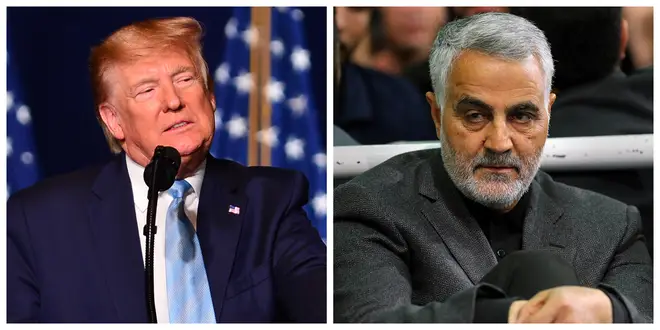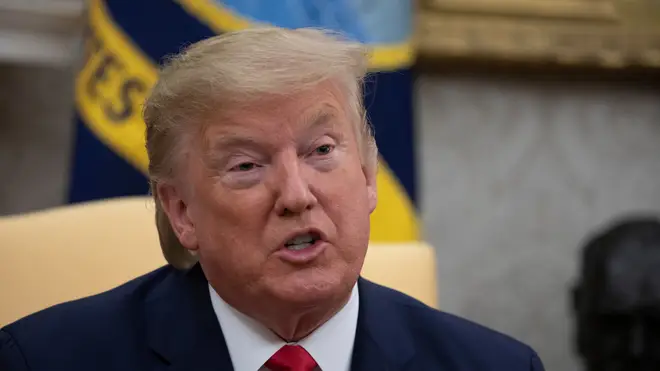
Henry Riley 7pm - 10pm
7 January 2020, 23:18

President Donald Trump has branded Iranian General Qassem Soleimani “a monster” and says his decision to order the commander’s killing has “saved a lot of lives.”
The US leader is under pressure to disclose more detail about the intelligence that led to the killing, which has greatly heightened tension with Tehran.
Mr Trump said Tuesday that his decision saved American lives and that members of Congress will be briefed on the reasons for the US attack.
He said: "We saved a lot of lives. They were planning something."
“He's been called a monster, and he was a monster, and he's no longer a monster, he's dead.

“That’s a good thing for a lot of countries. He was planning a very big attack.”
Secretary of state Mike Pompeo said it was clear that General Soleimani was continuing his efforts to build a network of activities "that were going to lead potentially to the death of many more Americans".
Defence secretary Mark Esper told reporters that Iranian threats against Americans were "days away" from being executed.
The President also said it is not the right time for the US to withdraw its troops from Iraq, claiming such a move would allow Iran to gain a stronger foothold there.
He added: "The people of Iraq do not want to see Iran running the country, that I can tell you.
But Iraq’s outgoing Prime Minister said the US has no alternative but to withdraw its troops, and said the country wants the move to avoid further escalation.
"We have no exit but this, otherwise we are speeding toward confrontation," Mr Abdul-Mahdi said in a pre-recorded televised speech following a weekly cabinet meeting.
He said the "historic decision" was necessary, "otherwise we will not be taken seriously".
A letter from Brigadier General William H. Seely, the commander of the US taskforce in Iraq, to his Iraqi counterpart, dated Monday, had said the US-led coalition would be "repositioning forces over the course of the coming days and weeks to prepare for onward movement".
Many media outlets initially reported that was formal notice that the US was withdrawing forces on Iraqi soil.
To Iran & its proxy militias: we will not accept continued attacks against our personnel & forces in the region. Attacks against us will be met w/ responses in the time, manner, & place of our choosing. We urge the Iranian regime to end malign activities. https://t.co/cykN5WBt1n
— Secretary of Defense Dr. Mark T. Esper (@EsperDoD) January 2, 2020
US defence secretary Mark Esper later clarified to reporters that there were no plans for American troops to leave Iraq.
General Mark Milley, chairman of the Joint Chiefs of Staff, said the letter had been "an honest mistake".
Mr Abdul-Mahdi responded that Iraqi authorities had thought the letter was legitimate when it was received, and were blindsided when US officials said it was sent in error.
"After four to five hours it was said that the letter was wrong," Mr Abdul-Mahdi said. "The letter clearly indicates a withdrawal."
"So in the future, what should we do if we get such a request? We should check if it is authentic or not? If we are late, then they will tell us that we are late," he said.
The prime minister's office had immediately sent the letter to the Iraq foreign minister and Iraq's ambassador in Washington and other parties, Mr Abdul-Mahdi said.
An initial Arabic translation of the letter had contradicted the English version, he added, and another copy was then resent.
"We have to hold discussions in order to reach the best ways for a withdrawal," he said.
Democratic lawmakers are not convinced by claims General Soleimani was planning imminent attacks.
Senate Minority Leader Chuck Schumer and Senator Bob Menendez, the top Democrat on the Senate foreign relations committee, are calling on Mr Trump to declassify the written notification the president sent to Congress after the fatal strike.
The notification was required under the War Powers Resolution Act of 1973, which requires the president to report to Congress when American forces are sent into hostile or imminently hostile situations.
"It is critical that national security matters of such import be shared with the American people in a timely manner," the senators wrote.
"An entirely classified notification is simply not appropriate in a democratic society, and there appears to be no legitimate justification for classifying this notification."